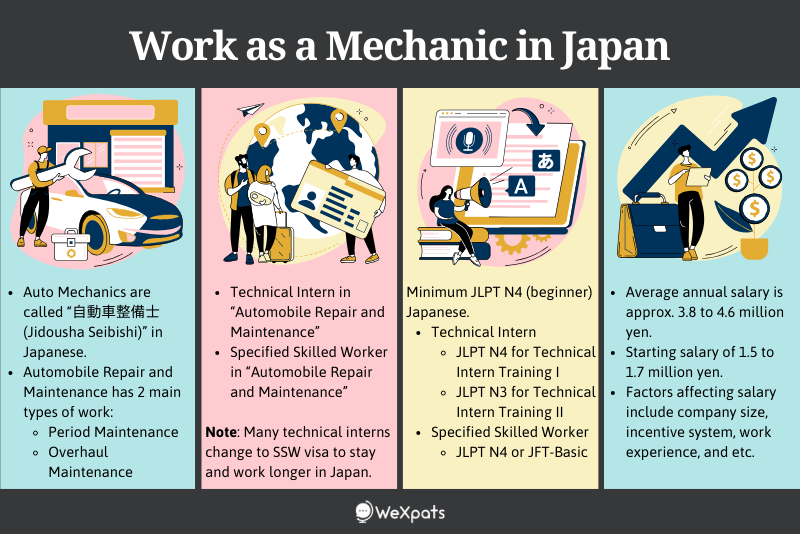Japan has a reputation for innovation and technological advancement in the automotive industry. For those interested and passionate about automobiles and machinery, working as a mechanic in Japan makes for an exciting and rewarding career.
Learn more about how to become a mechanic in Japan in this article.
First Published: 2020-11-16
Updated: 2024-04-15
Table of Contents
- Brief Look at the Automotive Industry in Japan
- How to Become a Mechanic in Japan
- Requirements for a Mechanic Job in Japan
- Mechanic Salary in Japan
- Find a Specific Skills Job in Japan with Leverages Global Support
 Are you having any issues with job-hunting in Japan?
Are you having any issues with job-hunting in Japan?
Brief Look at the Automotive Industry in Japan

For many years now, Japan has been one of the leading countries in the automotive industry for research, innovation and development. Dating back to the late 1910s and continuing even now, Japan has made a lot of major breakthroughs and brought great influence to the automobile industry worldwide. Honda, Toyota, Mazda, Nissan, Mitsubishi are just some of many familiar Japanese automobile manufacturers, discover others in our article here.
As a matter of fact, Japan has stood against top-tier countries such as the United States and Germany in producing large numbers of commercial vehicles. Japanese automobile brands are known for their durability. There is no doubt that the automotive industry is one of Japan’s core industrial sectors.
However, Japan’s automotive industry like many of their other industrial and manufacturing sectors are afflicted by the country’s serious labour shortage problem. The number of mechanics is decreasing with the average age of mechanics growing higher, and insufficient young people joining the industry. To combat this issue, skilled foreign workers, specifically automotive mechanics, are highly in demand in Japan.
Writer's Pick
How to Become a Mechanic in Japan

Automobile mechanics are in great demand in Japan. Interested in a career as a mechanic in Japan? There are several pathways to becoming a mechanic in Japan as a foreign national.
Attend a Mechanic Vocational School
Even if you have experience working as a mechanic in your home country, attending a vocational school is a good choice as it allows you to study and become familiar with Japan’s automotive industry and Japanese vehicles, and to learn Japanese. Most programs are 2 to 4 years in duration, depending on the school and the curriculum.
Other perks of attending a mechanic vocational school include:
-
direct introduction to both part-time jobs while attending and full-time jobs after graduating
-
the ability to obtain certifications and licences necessary for employment while at school
-
many schools offer scholarships
-
support and advice for adjusting to life in Japan, both from the school and fellow students
As there usually is a Japanese language requirement to enrol, some prospective students choose to attend Japanese language school first before enrolling. Some schools, like FSG College League, even offer courses that include Japanese language classes. Some, like Nissan Gakuen, are directly affiliated with certain car manufacturers so it’s easy to find a job within that brand group.
Become a Technical Intern
In Japan, there’s a program called the Technical Intern Training Program (技能実習, Ginou Jisshu) where individuals can learn technical skills and work in Japan with the goal of eventually bringing those skills back to their home country.
One of the categories you can become a technical intern for is “Automobile Repair and Maintenance”. By passing tests required of technical interns to complete the program, you may be able to skip some of the skills and Japanese level tests required for the Specified Skilled Worker visa, discussed next.
Obtain a Specified Skilled Worker Visa
With the Specified Skilled Worker visa, called 特定技能 (Tokutei Ginou) in Japanese, you can stay in Japan for up to 5 years while working in the industry you apply and qualify for.
Watch this introductory video by the Japanese government for a brief look at what it means to get a Specified Skilled Worker visa in Automobile Repair and Maintenance.
According to the official Specified Skilled Worker Program website, Automobile Repair and Maintenance has 2 types of work: period maintenance and overhaul maintenance. Japan hopes to employ roughly 7000 foreign nationals in this field under this visa by March 2024.
※Support Website for Specified Skilled Worker Program
To qualify, you must pass both the Automobile Repair and Maintenance Field Specified Skills Evaluation test and Japanese proficiency test. The Evaluation test is offered in Japan, Vietnam, and the Philippines and consists of both theory questions and practical tasks - both sections must be passed to pass the full evaluation. For Japanese proficiency, you are required to have N4 level Japanese language ability. Bear in mind that these tests are only offered periodically so keep in mind the dates you can take them!
Some technical interns will change to the Specified Skilled Worker visa to stay and work longer in Japan. The skills acquired and tests passed during the technical training are advantageous to obtaining the SSW status.
Are mechanics eligible for the “Engineer/Specialist in Humanities/International Services” visa?
An automotive mechanic is generally not eligible for the Engineer/Specialist in Humanities/International Services (技術・人文知識・国際業務) status of residence (visa type) in Japan. To qualify for this status of residence (visa type), you are required to have education and experience in mechanical engineering which goes beyond the scope of automotive maintenance and repairs, but more into the automotive creating and engineering side of the industry.
However, after obtaining the experience with a Specified Skilled Worker visa, it may be possible to switch to this type of visa depending on your specific skills and with the cooperation of your employer.
Requirements for a Mechanic Job in Japan

Auto mechanics are called 自動車整備士 (Jidousha Seibishi) in Japanese. You can search for job openings in Japan using this keyword. Each company has its own set of requirements, but these are the general requirements to become a mechanic in Japan.
Background in Auto Mechanic
As previously mentioned above, becoming a technical intern or obtaining a specified skilled worker visa are some of the pathways to becoming a mechanic in Japan. However, to achieve either of these requires prior knowledge or work experience in the auto mechanic field:
- For Technical Intern: experience working in the same field of work in home country
- For Specified Skilled Worker: pass the Specified Skills Evaluation Test in Automobile Repair and Maintenance
Japanese Language Proficiency
A high level of Japanese is not necessary for mechanics in Japan. Although JLPT N2 Japanese level is generally recommended for anybody looking to find work in Japan, as it opens many more job options. The minimum level of Japanese language proficiency you need is JLPT N4, which are requirements for technical interns and specified skilled workers:
- For Technical Intern:
- JLPT N4 (or J.Test equivalent) for Technical Intern Training I
- JLPT N3 (or J.Test equivalent) for Technical Intern Training II
- For Specified Skilled Worker: JLPT N4 or JFT-Basic (Japan Foundation Test for Basic Japanese)
Mechanic Salary in Japan

How much can a mechanic earn in Japan? The average annual salary of a mechanic in Japan is around 3.8 to 4.6 million yen, with starting salaries of around 1.7 million yen for junior college and vocational school graduates, and 1.5 million yen for high school graduates. The average monthly salary is 280,000 yen a month.
There are many factors that can affect the salary of a mechanic in Japan:
- Company Size
- Contract Terms & Conditions
- Working Hours
- Working Location
- Experience and Skills
Small and medium corporations offer around 4 million yen annually, while large companies may offer 5 million yen annually. Your work experience and skills will be evaluated and salary will be matched accordingly.
In addition, companies that have incentive systems in place, where employees’ salaries are determined by the company’s business performance and employee’s work performance may offer salaries up to 5 or 6 million yen annually.
Find a Specific Skills Job in Japan with Leverages Global Support

Leverages Global Support is a career support service that introduces jobs that require specific skills to specified skilled workers.
We also help with all the procedures required for employment and job changes, such as change of status of residence (visa type) and interview practice. If you have any problems after starting work, please feel free to contact us as well.
If you would like to know more about specified skilled workers and specific skills, please read this article, or contact a career advisor.
Recommended For
- Specified Skilled Workers who are thinking about changing jobs
- Technical Interns who want to switch to becoming a Specified Skilled Worker (You can try working in a new industry even with no experience!)
- International Students who have graduated from a Japanese school but are having trouble finding a job
How to Use Leverages Global Support
Ask for Job Recommendations
A career advisor will support you with your job search based on your desires. If you would like to be introduced to a specific skill job, feel free to send us a message using the link below.
Mention “WeXpatsを見た” at the beginning of your message, and our staff will respond promptly.
※ A Facebook account is required. Responses will be in Japanese.
Browse Jobs Yourself
You can search for the perfect job by specifying your Japanese level, occupation, work location, etc. We have many jobs available not only for Specified Skilled Workers, but also for Engineer / Specialist in Humanities / International Services.
※ You can register from outside Japan, but only those living in Japan can apply for jobs.



































